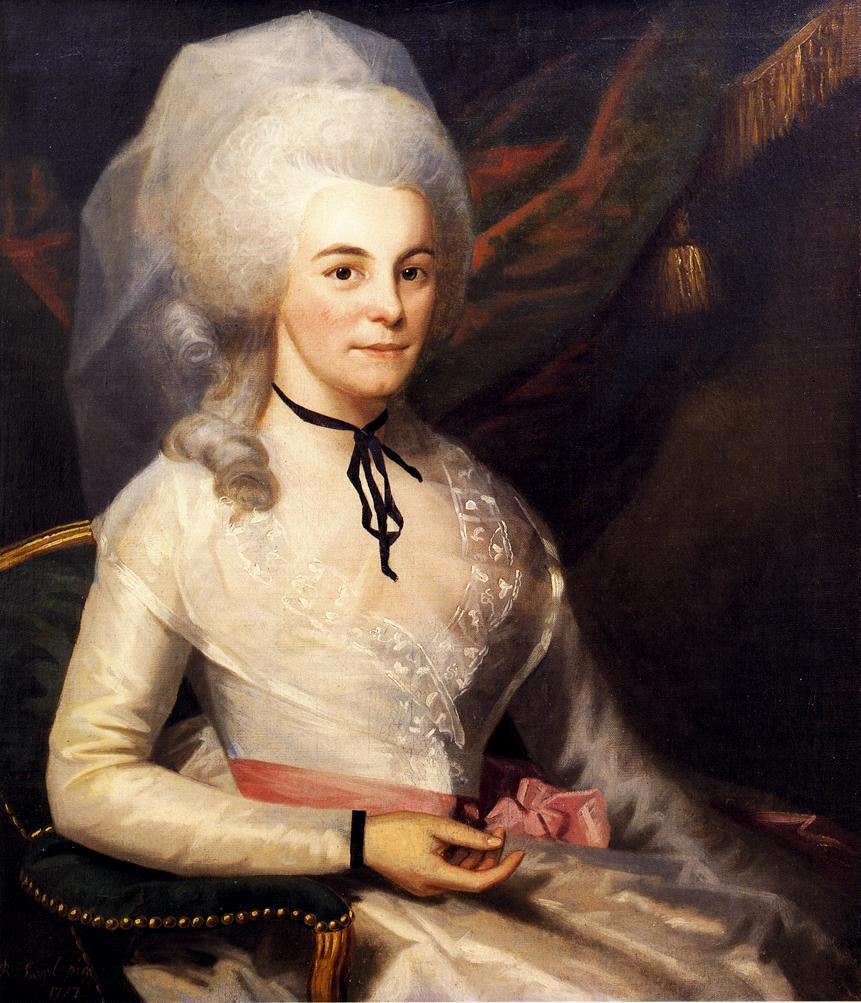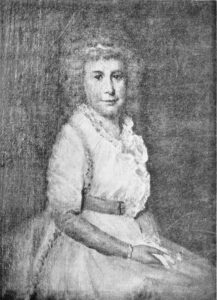“Angelica! Eliza! And Peggy!”
“Angelica! Eliza! And Peggy!”
Angelica Schuyler was born in Albany, New York, on February 20, 1756. She was the eldest daughter of Philip Schuyler and Catherine Van Rensselaer, both of whom were from wealthy Dutch families that had been prominent since early colonial days in New York. Her sister Elizabeth, known as Eliza, was born on August 9, 1757; Margarita, Peggy, was born on September 19, 1758.
Angelica would eventually have four sisters, Eliza, Margarita, Cornelia, and Catherine. She also did, in fact, have brothers John Bradstreet, Philip Jeremiah, and Rensselaer. Angelica, her siblings, and their parents formed the ‘Schyler family,’ a powerful group known for their wit and charm. The daughters, in particular, were all intelligent, beautiful, and sociable. Each played a different musical instrument, and they collectively could charm any and all visitors to the Schuyler mansion.[1]
Angelica, Eliza, and Peggy came of age during the American Revolution and were consistently around prominent revolutionary leaders through their father, a general under George Washington. The Schuyler house in Albany, New York, was a scene of many significant war meetings.
best replica watch site 2019razor phone 2 cases氓hlens elfhandyhulle lederphone cases with pictureskorting smartphonehoesjesboeren telefoonhoesjes
As a child, Eliza was often with her father. On one occasion, she accompanied her father to a six Nations meeting, also known as the Iroquois Confederacy. She also met Benjamin Franklin while he stayed at the Schuyler family home. Franklin liked and expressed “the ease and affability with which we were treated and the lively behaviour of the young ladies.”[2] One of George Washington’s aide-de-camps, Tench Tilghman, said, “There is something in the behavior of the general, his lady, and daughters that makes one acquainted with them instantly. I feel easy and free from restraint at his seat.”[3]
In his book Alexander Hamilton, Ron Chernow wrote, “The daughters had enough spunky independence that four of the five eventually eloped, Eliza being the significant exception. Cornelia enacted the most colorful escape, later stealing off with a young man named Washington Morton by climbing down a rope ladder from her bedroom and fleeing in a waiting coach.”[4] The Schyler girls were raised to have minds of their own. They were all fiercely independent and most certainly took after their parents, both of whom played no small role in the American Revolution.
Peggy may be the sister from the play that we talk about the least. Peggy was very beautiful but was also vain and arrogant. She married Stephen Van Rensselaer, six years her junior, the eighth patroon of Rensselaerswyck and the largest landowner in New York State.[5] He was also the grandson of Philip Livingston, a signer of the Declaration of Independence.
Peggy is most known for a story that took place on August 7, 1781, when a group of Tories and Native Americans forced their way into the Schuyler Mansion, searching for General Phillip Schuyler. The party intended to take Skyler as their prisoner.
According to legend, family members and guests, including Eliza and Angelica, both of whom were pregnant, ran upstairs to hide. They soon realized they had left their newborn sibling, Catherine, downstairs. Peggy went to rescue the baby and came face to face with the enemy. “Wench, wench! Where is your master?” he demanded. “Gone to alarm the town,” Peggy said with a cool head.[6] Legend maintains that one Native American hurled a tomahawk at Peggy’s head as she trotted up the stairs with the baby in her arms.[7]
The Schuyler sisters were all brave in their own way. With heavy constitutions, they made their way through life with their heads held high and never let anyone tell them who they ought to be. They may not have spent much of the Revolution in New York City; however, the sentiment portrayed in Broadway’s Hamilton still rings true.









THE SCHUYLER SISTERS
THE SCHUYLER SISTERS
[BURR]
There’s nothing rich folks love more
Than going downtown and slummin’ it with the poor
They pull up in their carriages and gawk
At the students in the common
Just to watch them talk
Take Philip Schuyler: the man is loaded
Uh-oh, but little does he know that
His daughters, Peggy, Angelica, Eliza
Sneak into the city just to watch all the guys at—
[COMPANY]
Work, work!
[ANGELICA]
Angelica!
[COMPANY]
Work, work!
[ELIZA]
Eliza!
[PEGGY]
And Peggy!
[COMPANY]
Work, work!
The Schuyler sisters!
[ANGELICA]
Angelica!
[PEGGY]
Peggy!
[ELIZA]
Eliza!
[COMPANY]
Work!
[PEGGY]
Daddy said to be home by sundown
[ANGELICA]
Daddy doesn’t need to know
[PEGGY]
Daddy said not to go downtown
[ELIZA]
Like I said, you’re free to go
[ANGELICA]
But—look around, look around,
The Revolution’s happening in New York
[ELIZA/PEGGY]
New York
[COMPANY]
Angelica
[SCHUYLER SISTERS AND COMPANY]
Work!
[PEGGY]
It’s bad enough daddy wants to go to war
[ELIZA]
People shouting in the square
[PEGGY]
It’s bad enough there’ll be violence on our shore
[ANGELICA]
New ideas in the air
[ANGELICA AND MALE ENSEMBLE]
Look around, look around—
[ELIZA]
Angelica, remind me what we’re looking for…
[ALL MEN]
She’s lookin’ for me!
[ANGELICA & COMPANY]
Eliza, I’m lookin’ for a mind at work (Work, work)
I’m lookin’ for a mind at work! (Work, work)
I’m lookin’ for a mind at work! (Work, work)
Whooaaaaa!
[ELIZA/ANGELICA/PEGGY with COMPANY]
Whooaaaaa!
Work!
[BURR]
Wooh! There’s nothin’ like summer in the city
Someone in a rush next to someone lookin’ pretty
Excuse me, miss, I know it’s not funny
But your perfume smells like your daddy’s got money
Why you slummin’ in the city in your fancy heels
You searchin for an urchin who can give you ideals?
[ANGELICA]
Burr, you disgust me
[BURR]
Ah, so you’ve discussed me
I’m a trust fund, baby, you can trust me!
[ANGELICA]
I’ve been reading Common Sense by Thomas Paine
So men say that I’m intense or I’m insane
You want a revolution? I want a revelation
So listen to my declaration:
[ELIZA/ANGELICA/PEGGY]
“We hold these truths to be self-evident
That all men are created equal”
[ANGELICA]
And when I meet Thomas Jefferson
[COMPANY]
Unh!
[ANGELICA]
I’m ‘a compel him to include women in the sequel!
[WOMEN]
Work!
[ELIZA]
Look around, look around at how
Lucky we are to be alive right now!
[ELIZA/PEGGY]
Look around, look around at how
Lucky we are to be alive right now!
[ELIZA/ANGELICA/PEGGY]
History is happening in Manhattan and we just happen to be
In the greatest city in the world!
[SCHUYLER SISTERS AND COMPANY]
In the greatest city in the world!
[ANGELICA, ELIZA/PEGGY & MEN]
‘Cause I’ve been reading Common Sense by Thomas Paine
Look around, look around
Hey! Hey! Hey! Hey!
So men say that I’m intense or I’m insane
The revolution’s happening in—
Hey! Hey! Hey! Hey!
[ANGELICA, ELIZA/PEGGY, WOMEN]
You want a revolution? I want a revelation
New York!
Look around, look around, the revolution’s happening
In New York!
So listen to my declaration:
[ANGELICA/ELIZA/PEGGY, FEMALE ENSEMBLE, & WOMEN]
We hold these truths to be self evident that all men are created equal
Look around, look around
Hey, hey, hey, hey
Whoo!
At how lucky we are to be alive right now
Hey, hey, hey, hey
[FULL COMPANY]
Look around, look around at how lucky we are to be alive right now!
History is happening in Manhattan and we just happen to be
[ALL WOMEN]
In the greatest city in the world
[ALL MEN]
In the greatest city—
[COMPANY]
In the greatest city in the world!
[COMPANY & ANGELICA]
Work, work! Angelica
[COMPANY, ELIZA, & PEGGY]
Work, work! Eliza
And Peggy!
[COMPANY & ANGELICA/ELIZA/PEGGY]
Work, work!
The Schuyler sisters
Work, work
We’re looking for a mind at work
Work, work (Hey)
Work, work (Hey)
Work, work
[COMPANY, ANGELICA, & ELIZA/PEGGY]
Work, work
Whoa!
Hey! Hey! Hey! Hey! Hey!
Work, work
In the greatest city in the world
In the greatest city in the world
[COMPANY]
In the greatest city in the world
[1] Ron Chernow, Alexander Hamilton (New York, New York: Penguin Books, 2004), 129.
[2] Carl Van Doren, Benjamin Franklin (Viking Press, 1968), 544.
[3] Mary Gay Humphreys, Catherine Schuyler (C. Scribner’s Sons, 1897), 136.
[4] Ron Chernow, Alexander Hamilton, 129.
[5] Ron Chernow, Alexander Hamilton, 133
[6] Anna K. Cunningham, Schuyler Mansion, a Critical Catalogue of the Furnishings & Decorations (Division of Archives and History, New York State Education Department, 1955), 205.
[7] Ron Chernow, Alexander Hamilton, 282
Leave a Reply